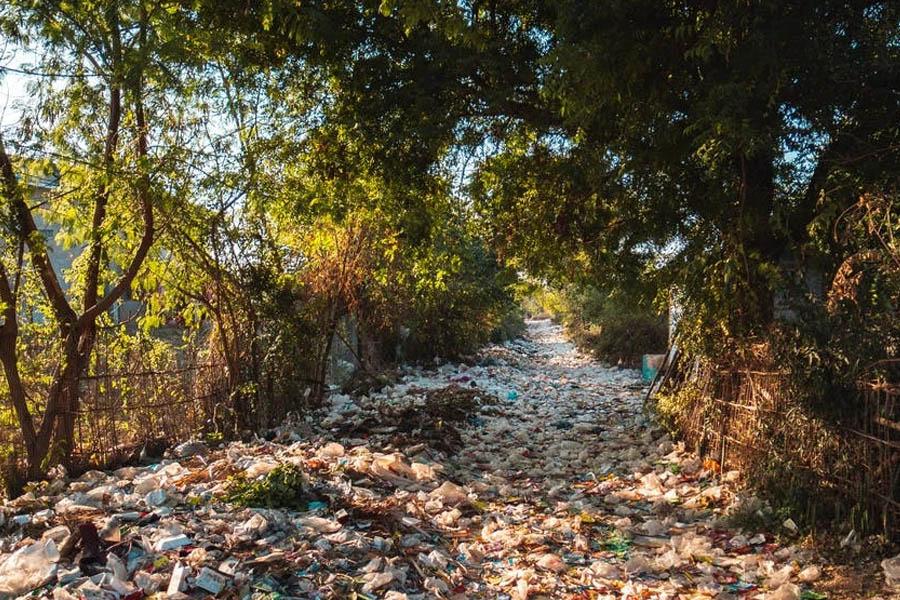
Building a plastic-free future.
Share
For a long time, plastic packaging was so ubiquitous we never imagined an alternative. It was just there, covering everything in the supermarket, all the time. Shrink-wrapped bananas didn’t seem ridiculous, and waste packaging just went ‘away’ when we threw it in the bin.
Well, of course it didn’t and we now look at things a little differently. Thankfully.
We now know that when it’s thrown away, plastic doesn’t decompose. It just breaks down into smaller pieces. It ruins ecosystems, and harms creatures in the sea, land and sky.
Our oceans are particularly vulnerable to plastic pollution. We’ve recently learned of the existence of The Great Pacific Garbage Patch, an enormous accumulation of waste plastic halfway between Hawaii and California. More of a dispersed ‘asteroid field’ of plastic, rather than one solid unit, it’s estimated to weigh 80,000 tonnes in total, and contains more than 1.8 trillion pieces of plastic. It’s an environmental disaster, fuelled by single-use plastics and poor environmental practice by manufacturers, retailers and customers. And it’s not the only one of its kind - there are 4 similar zones in subtropical marine regions around the world.
If we’re going to participate in the global consumer economy, don’t we have a responsibility to deal with this issue? How can we begin to tackle this problem?
It Starts with Straws
One visible beacon of this hot topic is the plastic drinking straw. A heartbreaking and difficult-to-watch video of a turtle with a plastic straw stuck in its nose that went viral a few years ago lodged the straw in pop culture’s consciousness; the symbol of all that is wrong with throwaway consumer culture, harming an innocent bystander of the natural world.
It provoked action; Starbucks Coffee pledged to remove their bright green plastic disposable straws from all stores globally by 2020, replacing them with paper straws or sippable lids. Some claim a poor user experience, but a paper straw that disintegrates slightly quicker than you’d like it to is a small price to pay for a healthier environment. In Japan, Nippon Paper Industries is fighting the problem of disintegrating paper straws with new structural manufacturing techniques, aiming to bring the price down significantly (they can cost five to ten times more than plastic, currently).
Straws are now even being politicised with partisans squabbling over whether or not the topic is worth addressing. The UK government will be banning the use of plastic straws from April 2020, along with plastic drink stirrers and cotton buds.
But straws are just the tip of the melting iceberg. The amount of plastic in the ocean is predicted to treble (!) by 2025, according to the UK Government’s Future of the Sea report.
Solutions to the single-use problem
A combination of innovative new technologies and changing cultural attitudes means there’s a powerful, growing trend towards positive change.
Technology-wise, there are two angles to tackle the problem. The first is at the source, by changing manufacturing and business processes to eliminate plastic as much as possible, replacing it with other materials. The second is reusing, recycling and removing plastic from the places it shouldn’t be in the first place.
At least one fantastic innovation is being deployed to clean up the aforementioned Pacific Garbage Patch; a 600-metre long artificial coastline that floats on the ocean surface, using ocean currents to surround and trap the debris while boats arrive to pick it up and take it away.
On a less grand, but equally important note, there’s the plastic carrier bag. This single-use consumer accessory was accepted as normal for too long a time. Seeing them stuck in tree branches and littering the streets was all too common until fairly recently, when the UK government introduced a 5p carrier bag charge in 2015 for large retailers. This endeavour, which specified mandatory donations instead of being a tax, has since raised over £50million per year for good causes, including environmental charities. It also saved millions in cleanup costs and reduced carbon emissions. And the best part is that it resulted in national plastic bag usage reducing by over 80% - that’s more than 9 billion fewer plastic bags.
The ease of which this program was rolled out and accepted by most of the public shows that people do care about their environment as well as convenience in their daily lives.
In fact, this is provoking a rethink of the entire retail experience for some enterprising individuals. More and more plastic-free grocery shops are opening, encouraging customers to bring their own tubs or containers, filling them up with food and paying by weight. While some things do need packaging for hygiene reasons (eg. fresh items, meat), any effort to reduce the overabundance of single-use waste materials in the retail cycle should be applauded.
For those that need some sort of packaging to transport their goods, like online retailers for example, alternative environmentally-friendly materials are a superb idea. Biodegradable, compostable packaging is on the rise, and it’s not just limited to eco-friendly companies. Some food retailers are even responding to customer demand by experimenting with edible packaging.
Wouldn’t it be great if all retailers could remove plastic from their supply chains? It’s a brighter future for us and our environment - and it’s entirely possible.
Our gummy supplements are delivered in plastic-free packaging, so you can be confident of your minimum-waste footprint when ordering your Nourishments.